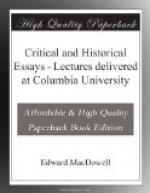In France the Provencal poetry lasted only until the middle of the fourteenth century, after the troubadours had received a crushing blow at the time the Albigenses were extirpated in the thirteenth century.
In one city alone (that of Beziers), between 30,000 and 40,000 people were killed for heresy against the Pope. The motto of the Pope’s representatives was “God will know His Own,” and Catholics as well as Albigenses (as the sect was called) were massacred indiscriminately. That this heresy against the Pope was vastly aided by the troubadours, is hardly open to doubt. Such was their power that the rebellious, antipapal sirventes of the troubadours (which were sung by their troops of jongleurs in every market place) could be suppressed only after the cities of Provence were almost entirely annihilated and the population destroyed by the massacre, burning alive, and the Inquisition.
A review of the poems of Bertran de Born, Bernart de Ventadour, Thibaut, or others is hardly in place here. Therefore we will pass to Germany, where the spirit of the troubadours was assimilated in a peculiarly Germanic fashion by the minnesingers and the mastersingers.
In Germany, the troubadours became minnesingers, or singers of love songs, and as early as the middle of the twelfth century the minnesingers were already a powerful factor in the life of the epoch, counting among their number many great nobles and kings. The German minnesingers differed from the French troubadours in that they themselves accompanied their songs on the viol, instead of employing jongleurs. Their poems, written in the Swabian dialect, then the court language of Germany, were characterized by greater pathos and purity than those of the troubadours, and their longer poems, corresponding to the chansons de geste of the north of France, were also superior to the latter in point of dignity and strength. From the French we have the “Song of Roland” (which William the Conqueror’s troops sang in their invasion of England); from the Germans the “Nibelungen Song,” besides Wolfram von Eschenbach’s “Parzival” and Gottfried von Strasburg’s “Tristan.” In contradistinction to the poetry of the troubadours, that of the minnesingers was characterized by an undercurrent of sadness which seems to be peculiar to the Germanic race. The songs are full of nature and the eternal strife between Winter and Summer and their prototypes Death and Life (recalling the ancient myths of Maneros, Bacchus, Astoreth, Bel, etc.).




